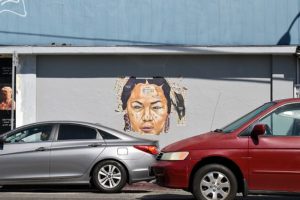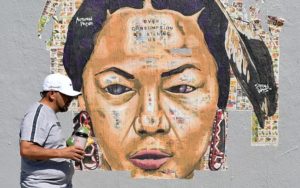Anishinaabekwe Water Warrior Autumn Peltier included in American street art series

By Laura Barrios
TECATE DIVIDE, SAN DIEGO COUNTY – A young, American artist has paid homage to the Water Warrior following the late September excitement of Anishinabek Nation Chief Water Commissioner Autumn Peltier, 15-year-old Anishinaabekwe and internationally-recognized clean water advocate addressing the United Nations at the 2019 Global Landscapes Forum in New York and taking part in one of the many Global Climate Strikes.
Stefan Ways, a resident in the Tecate Divide, San Diego County, transplanted from Baltimore, Maryland, felt inspired to add a portrait of Peltier to his street art series, Overconsumption is Killing Us, a project that has been in development over the past year and a half.
“The reason I chose Autumn is for the fact that we have trampled over Indigenous land and culture and just continued to suck resources out of the small places we have forced Indigenous people to be in and she’s a child and children are going to inherit the earth that we have and are currently living and creating. Right now we have this sort of throwaway culture of just use it once, don’t worry about who created it or where it’s going once we’re done with it,” explained Ways. “I’ve been wanting to represent children and Indigenous cultures somehow with my projects but I kept putting it off because I wasn’t really sure when the right time to address it was. But now’s the time – when children have a voice now more than ever and have an audience and people listening…She was chosen for both of those reasons – as a child and to represent the Indigenous people that we forget about in our Western-consumer culture.”
Peltier’s portrait, which is painted on weekly advertisements and flyers that Ways collected as a commentary on the overconsumption and how it correlates to climate change, is the 25th piece to be added to the street art series.
“The series is to bring awareness of our consumption habits and the fact that we’re not really aware of the processes that precede and proceed what’s in our hands when we’re consuming it,” described Ways. “One of the things we’re not aware of as far as the consequences proceeding what we’re consuming, is the environment.”
Conversations on the environment and climate change are ramping up because of youth activists like Peltier bringing it to the forefront. Her advocacy for clean water, with particular emphasis on many Northern Ontario First Nations’ lack thereof, has garnered much attention in years past but particularly piqued the interest of many worldwide in recent months attributed to the focus on the global climate crisis.
“Learning about her has been fairly new— in the past month – with the rise of youth and climate strikes, her name came to light. It’s easy for people to be worried about the umbrella – everything— but I like how her focus is on water. It’s something that really is not talked about. Clean water for everyone is becoming extremely difficult,” noted Ways.

Much like his other pieces in his series that can be found in high-trafficked locations in Germany, France, or various home-based locations in the United States, Ways’ artwork of Peltier is showcased on Melrose Avenue, a bustling dining and entertainment destination in Los Angeles, bookended by Santa Monica Boulevard and East Hollywood.
“These things are important to get into areas where people are so consumed by the cities – there’s nothing that breaks your attention—street art breaks your attention and your day and gives you a moment of reflection,” stated Ways. “The idea is to put them back out onto the street where they can create a conversation. Put them on social media where they create conversation. It needs to start with a conversation. As humans, we have three stages of doing things: we think about things, we create the conversation about things, then we create actions about these conversations. As humanity, we’re kind of in this conversation phase but finally getting into the action stage and we can only hope it’s not too late.”
Ways believes that Peltier is standing in her truth and demonstrates her strength in her advocacy efforts.
“For Autumn to bring it all the way up to Justin Trudeau – I think kids don’t realize how much power they have. I think a lot of the time, adults pretend that kids don’t have power or they don’t really have a concept of the world, but I feel like a lot of the times children are the most sensitive to what’s going on in the world,” expressed Ways. “The earth really is speaking through her, setting a precedent for her generation. It’s a heavy, heavy weight to hold, but I really admire her.”
Ways encourages passerby of his artwork to pause to reflect on the history of the product they are consuming and the impacts it has had and will have long after consumption. The installment can be found on the intersect of Melrose Avenue and Normandie Avenue.


